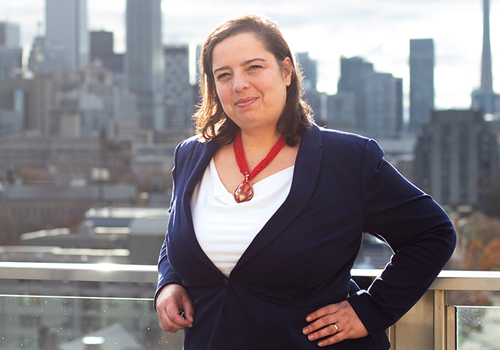For their impact that stretches far beyond the University of Toronto, five leaders in medicine, law, engineering, social work and the humanities are receiving President’s Impact Awards.
“The University of Toronto is very proud of these researchers, whose work is leading to important change here at home and around the world,” said Vivek Goel, U of T’s vice-president of research and innovation and strategic initiatives. “Their work, across a diverse range of fields, is reaching beyond academia and improving life for a broad cross-section of society locally and globally.”
The winners are:
- Tom Chau of the Institute of Biomaterials & Biomedical Engineering
- Barbara Fallon of the Factor-Inwentash Faculty of Social Work
- Audrey Macklin of the Faculty of Law
- Stephen Hwang of the Department of Medicine in the Faculty of Medicine
- Anna Shternshis of the Department of Germanic Languages and Literatures in the Faculty of Arts & Science
Winners of the President’s Impact Awards receive $10,000 per year for five years to be used toward their research, and become members of the President’s Impact Academy.
Professor Anna Shternshis

For her work on the Yiddish Glory project, giving public voice to those who created music during the Holocaust, Professor Anna Shternshis has received the President’s Impact Award.
“Receiving the President’s Impact Award for this research is not just an incredible honour for me, it is a profound recognition for people who, despite being silenced by Hitler and Stalin, continued to sing,” said Shternshis, a leading scholar of Russian Jewish history and culture in the Faculty of Arts & Science.
Shternshis’s research into the anti-fascist Yiddish songs of Jewish children, women and men interned and killed in Nazi-run ghettos in Ukraine has had a lasting impact around the world. It resulted in a recording entitled “Yiddish Glory: The Lost Songs of World War II” which was nominated for a 2019 Grammy award and the subject of more than 500 print, radio and television stories in 50 countries.
“Ethnomusicologist Moisei Beregovsky, who first collected this music just as these towns were liberated in the 1940s, was sent to jail for conducing this project. His collection was confiscated and presumed destroyed,” Shternshis said. “When I was able to bring these works back to life, by telling the story of both the amateur songwriters and Beregovsky’s efforts to preserve their music, it felt like conducting an act of historical justice.”

